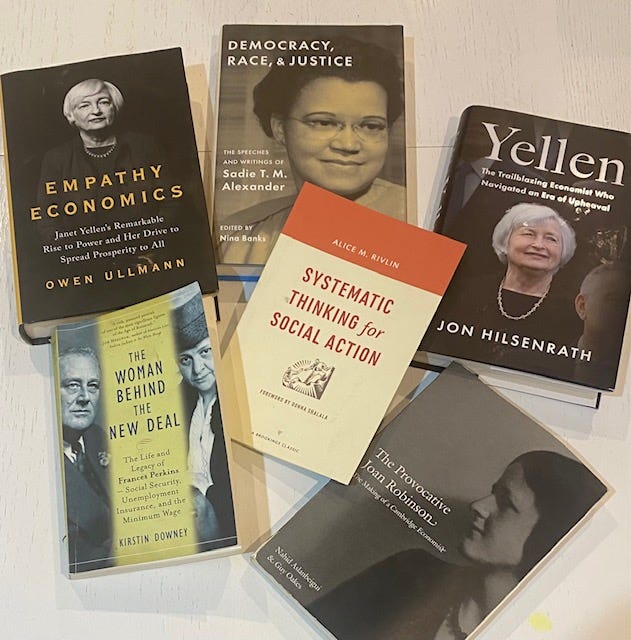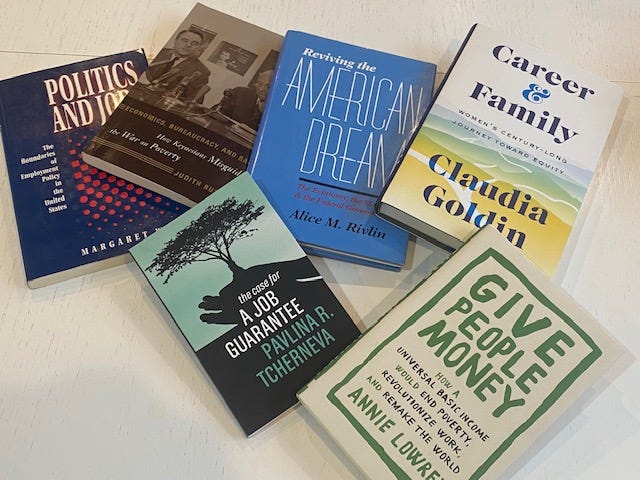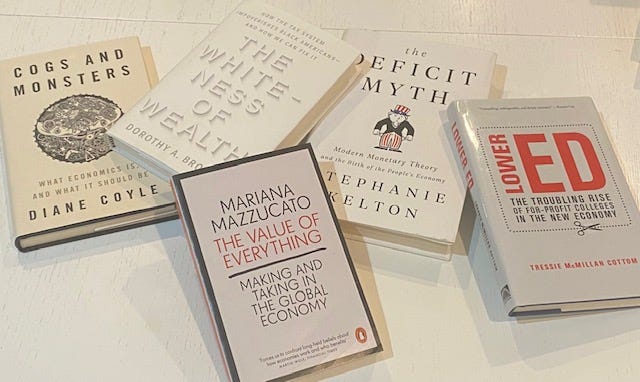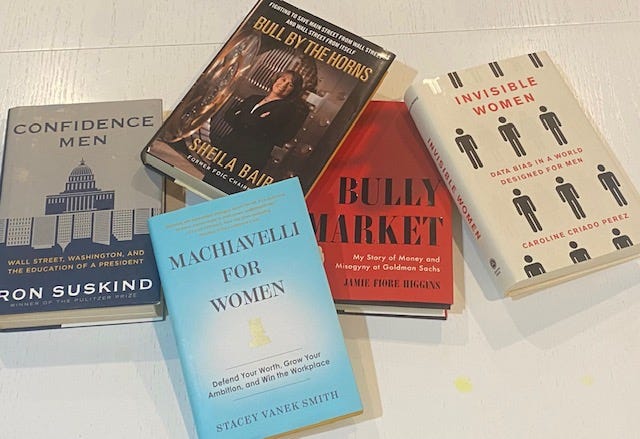Inspirational economics
Economic policy is at a crossroads and it's essential for new thinking and new experts.
Today’s post shares many experts who inspire me to think about how economic policy must improve and better serve people worldwide.
Trailblazers in new economic thinking.
As we look to the future and try to understand the present, we must recognize the creative economic thinkers who paved the way. These individuals inspire me—Janet Yellen, Alice Rivlin, Frances Perkins, Sadie T. M. Alexander, Joan Robinson, and others. Here are the books Empathy Economics, The Woman Behind the New Deal, Democracy, Race, and Justice, Systematic Thinking for Social Action, Yellen, and The Provocative Joan Robinson.
Here’s my thread on Frances Perkin’s biography. She especially inspires me as I work on fiscal policy. Perkins dedicated her career—against the odds and despite many setbacks—to building economic policies that serve us to this day.


Innovative ideas to make the economy work for everyone.
Our economy does not work for everyone. As I wrote yesterday, the top 0.1% of families by wealth have $17 trillion, four times the wealth of the bottom 50% of families. In the United States, in 2019, 10.5 million children lived in poverty. The current policies have fallen short for generations. Ideas abound on how to do better.
Some new thinking to engage with Margaret Weir’s Politics and Jobs; Judith Russell’s How Keynesians Misguided the War on Poverty; Pavlina Tcherneva’s A Job Guarantee; Alice Rivlin’s Reviving the American Dream; Claudia Goldin’s Career and Family; and Annie Lowrey’s Give People Money.
It’s crucial to put good ideas into action. Yesterday, Michael Hiltzik argued in the Los Angeles Times that Congress should bring back the Child Tax Credit in the American Rescue Plan, which had no income or work requirements, and contributed substantially to a 46% reduction in child poverty in 2021. Then it expired.

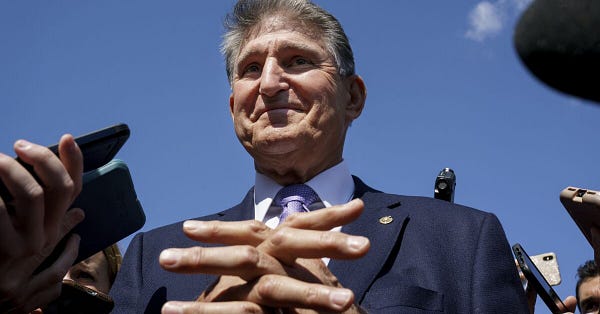
I firmly agree. In his piece, I offer moral and economic reasons for the program:
“In the richest country in the world, there should not be a single child who cannot eat in the morning or who is living in a car,” says Claudia Sahm.
As Sahm has pointed out, the enhanced credits were a proof-of-concept that cash benefits are best at fighting poverty. They’re flexible, leaving it up to families to determine their most pressing needs and decide how best to deploy the financial assistance.
“We’re leaving money on the table,” Sahm told me. “If they have the opportunity to flourish, to be healthy, to have a childhood, these children are going to be much more productive. They will be workers someday, and by making the Child Tax Credit a workforce program for adults now, we are undermining the workforce of the future.”
It’s time to re-think the system.
If it ain’t broke, then don’t fix it. Our economy is broken, and it’s time to fix it. The disastrous Global Financial Crisis in 2008, the crushingly slow recovery from the Great Recession, and the failure of Congress to invest in our people for decades, including this year, underscore the need for systemic change.
The ideas are out there. Here are some I find inspiring: Diane Coyle’s Cogs and Monsters; Dorothy Brown’s The Whiteness of Wealth; Mariana Mazzucato’s The Value of Everything; Stephanie Kelton’s The Deficit Myth; and Tressie McMillan Cottom’s Lower Ed. (Another not pictured is Mehrsa Baradaran’s The Color of Money.)
It’s frustrating to see hostile reactions to new ideas and toward the experts who bring them to us. Stephanie Kelton is a good friend, and it angers me to see her work and character attacked by our men peers. See my post earlier this year about attacks on her, Jeanna Smialek, and Lisa Cook, all in one week!
Enough is enough. Stop attacking new thinkers.
People bringing new ideas to policy discussions must clear a high hurdle. The status quo is hard to change. A toxic environment raises the bar far higher. It’s hard to change the policy and fight off abusive men and women.
The economic policy world presents particular challenges since men have played a dominant role as advisers and policymakers. It’s easy to be discouraged; professional attacks can keep you out of the room, and it’s hard to stay healthy. These books are the tip of the iceberg: Ron Suskind’s Confidence Men; Stacey Vanek Smith’s Machiavelli for Women; Sheila Bair’s Bull by the Horns (applies to the prior section, too); Jamie Fiore Higgin’s Bully Market (this one is disturbing); and Caroline Criado Perez’s Invisible Women. Change is urgent.
Here is my post on how to push for change.
In closing
My post is to inspire you, not to provide an exhaustive list. I hope that you find something inspiring here. Reminder, books make great holiday gifts.
As you may have noticed, the experts and ideas I shared are from women or relate to women’s experiences in policy, finance, and economics. Please add your inspirational women experts and their new thinking to the comments.




